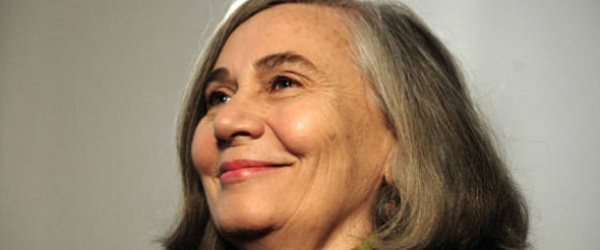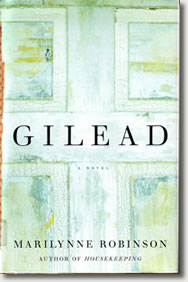
Book Review: “Gilead” by Marilynne Robinson
Books, ReviewsIn trying to show us the light, the author illuminates the darkness.

Marilynne Robinson’s “Gilead” is part fiction, part philosophical treatise. And like the best meditations, Robinson’s story gives the reader a new perspective on the world. Published in 2004, “Gilead” won the Pulitzer Prize the following year. In 2008, Robinson published a sequel, “Home”, which recounts the events in this story from another character’s point of view. The narrator, a seventy-six year-old preacher named John Ames, is dying of heart failure. He begins a diary to his seven year-old son, described as “an experiment with candor”, a father’s attempt to pass on a lifetime of collected wisdom. Along the way, the reverend’s capacity for faith, love, and forgiveness are severely tried.
“Gilead” is told in two distinct sections. The action unfolds in Gilead, Iowa in 1957. In the first half of the novel, we learn that John Ames’ had a wife and daughter who both died in childbirth. Decades later, Ames falls in love with Lila, an uneducated and much younger woman. Like his father and grandfather before him, John Ames is a preacher. He baptizes Lila, they are married, and at the age of sixty-nine Ames has a son with his new bride.
Ames sketches the town’s early days as a haven for abolitionists in the late nineteenth century. Grandfather Ames was a follower and protector of John Brown, and lost an eye in the bloody skirmishes leading up to the Civil War, leaving him half-blind. But the elder Ames’ militant actions and fiery sermons ended in violence and death for many in his congregation, causing a generational rift in the Ames family. This idea of inherited, original sin becomes the bedrock upon which Robinson constructs the gripping psychological drama that will unfold in the novel’s second half.
Ames initially presents himself as the perfect father figure: calm, reasonable, tender, forgiving. His wife and son are idealized in his thoughts and prayers. With a philosopher’s powers of perception, Ames is trying to show his young son the light that has guided him for so many years:
“In the matter of belief, I have always found that defenses have the same irrelevance about them as the criticisms they are meant to answer. I think the attempt to defend belief can unsettle it, in fact, because there is always an inadequacy in argument about ultimate things. We participate in Being without remainder … you can assert the existence of something – Being – having not the slightest notion of what it is. Then God is at a greater remove altogether – if God is the Author of Existence, what can it mean to say God exists? There’s a problem in vocabulary … So my advice is this – don’t look for proofs. Don’t bother with them at all. They are never sufficient to the question, and they’re always a little impertinent, I think, because they claim for God a place within our conceptual grasp. And they will likely sound wrong to you even if you convince someone else with them. That is very unsettling over the long term … I’m not saying never doubt or question. The Lord gave you a mind so that you would make honest use of it. I’m saying you must be sure that the doubts and questions are your own, not, so to speak, the mustache and walking stick that happen to be the fashion of any particular moment.”
Ames loves his infant son unconditionally. Or so it seems. But the preacher’s equanimity feels less than honest. He’s holding something back. We soon discover that another man carries John Ames’ name – the young John Ames “Jack” Boughton. Jack is the son of Ames’ best friend, the ailing Presbyterian minister Reverend Robert Boughton. And Jack’s back in town to visit his own dying father.
Jack is the proverbial prodigal son, a recovering alcoholic with a mean streak who seems to ruin everything he touches. In his youth, Jack Boughton had an illegitimate young daughter who died from neglect – a sin our narrator refuses to forgive. Even the mention of Jack’s name is enough to send Reverend Ames into paroxysms of doubt and anger.
Within a few pages of meeting Jack Boughton we understand that John Ames is facing the most important struggle of his life. The love Ames professes for his own son can only be truly unconditional if the preacher can find a way to love, and forgive, young Jack Boughton for his youthful transgressions.
If the first portion of the reverend’s diary gives us a glimpse at the light of his steady and simple faith, the next is a complicated exploration of his doubts and misgivings. It is not a journey our narrator accepts willingly. The preacher often tries – and fails – to communicate with young Jack, cowed by his failing health and lifelong animus toward the young man. But time is running short, and a failure to be honest with himself, with his son, and with the reader will have repercussions for Ames’ very soul:
“This is an important thing, which I have told many people and which my father told me, and which his father told him. When you encounter another person, when you have dealings with anyone at all, it is as if a question is being put to you. So you must think, What is the Lord asking of me in this moment, in this situation? If you confront insult or antagonism, your first impulse will be to respond in kind. But if you think, as it were, This is an emissary sent from the Lord, and some benefit is intended for me, first of all the occasion to demonstrate my faithfulness, the chance to show that I do in some small degree participate in the grace that saved me, you are free to act otherwise than as circumstances would seem to dictate. You are free to act by your own lights. You are freed at the same time of the impulse to hate or resent that person. He would probably laugh at the thought that the Lord sent him to you for your benefit (and his), but that is the perfection of the disguise, his own ignorance of it.”
It is not enough to embrace the light, Robinson argues. This is only part of the picture. Those who never use that light to illuminate the shadows are walking through life like Ames’ grandfather, half-blind. Even the darkest hearts are beautiful, and worthy of God’s unconditional love. If we are up to the truly heroic task of looking past our own shortsighted selves, the author argues, we will be rewarded with the gift of real sight.























[…] review was originally published at Zouch Magazine) This review is one in a series for what I’m calling the The DIY MFA in Creative […]